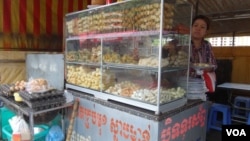The smell of the fried meatballs can be mouth-watering to Ly Sok Mouy and a group of her friends, who are stirring sauces to their own taste recently, mixing black pepper and salt, lemon juice, soy sauce, pickled onions and chilies.
Ly Sok Mouy, 22, is a senior at Phnom Penh International School who eats meatballs very often. “I like eating street food because it is cheap,” she says. “Most of my friends do not have much money for other choices of food. Besides, it is convenient, because we do not have to cook on our own, and we are free to chit-chat here.”
Street food is very popular in Phnom Penh, particularly among the city’s youth. Fried meatballs, hotdogs, grilled chicken and other foods can be found nearly everywhere in the capital, near high schools, outside factories, on the sidewalks, from mobile vendor carts. But as tasty as much of this food is—and cheap—medical experts warn that it can have serious health effects.
Theary Monyraith is an 18-year-old sophomore at CamEd Business School. She says she eats street food almost everyday. “The price is affordable and the taste is nice,” she says. “Because we don’t know where else to go, we eat meatballs after class.”
The price of street food is a major draw, especially for students or factory workers. A group of four to five people can spend as little as 10,000 riel, or $2.50, for a meal.
Local street food stalls are as busy as Western fast food stalls—the space is crowded and seats are often full. Street food businesses have existed for more than a decade in the city, but the sector has boomed in the last few years.
Wiping the dirt from the tables and chair in her stall, Kim Suang, a 30 year-old street food vendor behind Preh Sisowath High School, describes her business as a necessity, one that has brought income for her family of 10 people over the last decade. These days, she says, she brings in more than $500 a day and sells more than 50 kilograms of meatballs a day—beef, hotdog, seafood, even tofu.
Much of the industry’s meat comes from Thailand, though some is imported from Vietnam and China. And despite its popularity, health experts warn of its risks. Such diets can bring about high blood pressure and obesity, due to high fat and cholesterol. And some preservatives in the meat can be damaging to organs.
There are other health hazards, as well. According to the CamControl’s laboratory director, Dim Theng, some illegally imported meatballs from Thai border are seized for not following the standards of food safety for storage and transport. “They don’t keep it at the standard temperature allowed, and thus will make the meatballs decay and become very harmful to a Cambodian’s health,” he says.
The Ministry of Health does have a safety control office for street food safety, but food vendors say they are rarely inspected. Officials there declined to be interviewed.
Seang Huy, a researcher at the Sciences and Technology Research Institution at the Royal Academy of Cambodia, says she has found toxic substances in meatballs, such as the chemical borax. The chemical, used to keep the meat fresh for longer periods of time, can damage the urethra and kidneys, she says. “In the short term, it makes the consumer’s head ache, or stomach itch, and so on. When consumed over five to 10 years, it can cause lung cancer.”
Chey Vitiyarithy, a doctor at Calmette Hospital, says that if the meatballs are not stored at the proper temperature, they can rot and become dangerous. “It may cause physical disability, if people consume it as a habit as these days,” he says.
Cambodians need to be wary of the street food trend, he says. In the long run, it could lead to a future health crisis.







